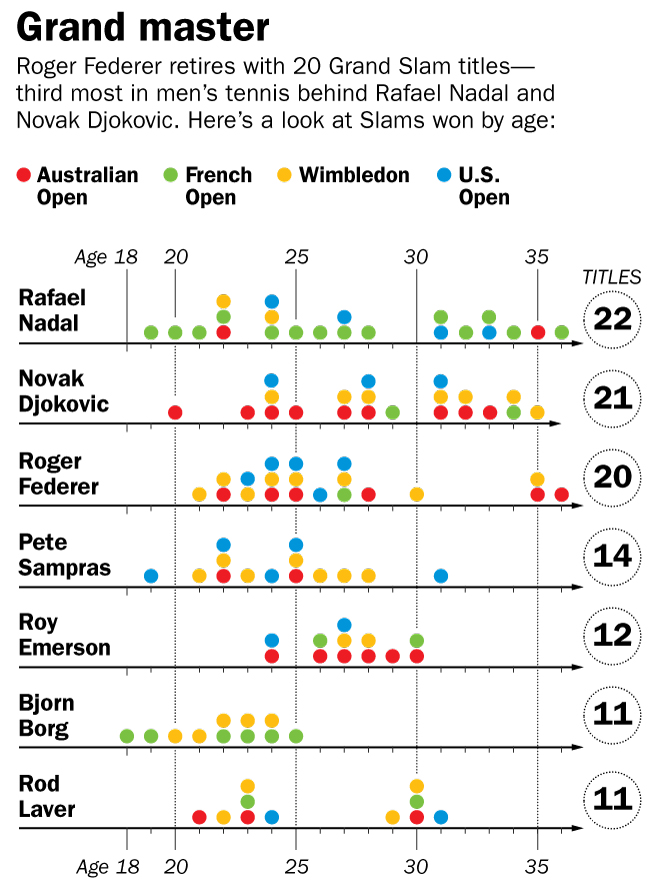Roger Federer was on the phone line, from his home in the Swiss Alps. He told me he was gazing out at the mountains, tired but relaxed and reflective. If he wasn’t sipping on some fine Cabernet as he spoke, he sure should have been. Just to complete the picture of a man enjoying his moment.
This was back on February 1, 2017, a few days after Federer—who announced his retirement from tennis, at 41, on Thursday—completed another signature feat of his astounding career. Back from a six-month layoff after a knee injury, one of the many physical setbacks that stilted the later stages of Federer’s run, and ultimately drove him to his decision to stop playing, Federer battled back from a fifth-set deficit to best his era-defining rival, and now friend, Rafael Nadal, in the Australian Open final. The win gave Federer his 18th Grand Slam title—he’d finish with 20—at age 35.
He started opening up to TIME about how this gritty win might finally silence those who would nitpick perhaps the only flaw in his game: the ability to rise to the mental challenge against the fierce player who got the best of him more often than not, Nadal.
“My mental toughness has always been overshadowed by my virtuosity, my shot-making, my technique, my grace,” Federer told TIME that day. “That’s why when I lose, it seems like, ‘Oh, he didn’t play so well.’ And when I win, it looks so easy. I had that already when I was a little boy. You know, ‘Why don’t you try harder?’ I mean, honestly I tried everything that I possibly could. Just because I don’t sweat like crazy and I don’t grunt, I don’t have this face on when I hit the shot like I’m in pain, doesn’t mean I’m not trying hard. It’s just how I play. Sorry.”
No apologies needed. For these words, more than any others I can recall over almost two decades of covering Federer, neatly sum up a champion in his element. “My virtuosity, my shot-making, my technique, my grace.” Federer never trafficked in false modesty. And why should he? He’s graceful, and he knows it. He was great, and he knew it.
But arrogant? No way.
MORE: Roger Federer Is Retiring. Watch Reflect On His Career.
It’s only fitting, then, that Federer leaves tennis a few weeks after Serena Williams. They’re now forever connected via similar comfort in their own greatness. “We changed the game of tennis,” Williams told TIME in August, before her final tournament run at the U.S. Open., referring to herself and her sister Venus. “We changed how people play, period.” What’s her legacy? “Confidence and self-belief,” Williams responded.
The same could be said for Federer. In a flash, tennis lost two players with 43 Grand Slam titles between them. Sure, tennis will never be the same. But the game is so much better for them.

Unlike some of his superstar brethren, Federer never really slipped, in ways big, small, or otherwise. Tiger Woods’ peccadillos altered his trajectory. LeBron James’ approval ratings dipped after “The Decision.” Lionel Messi ran afoul of tax laws. Count Deflategate against Tom Brady, if you wish.
Serena had a few spats with umpires she’d like to have back. Relatively small potatoes, sure. But something.
But remember that Roger Federer controversy everyone got so worked up about? Neither do I. It’s nearly impossible, under the glare that global-athlete icons face in the 21st century, not to make some kind of public mishap. It’s a testament to Federer that he never really did.
Is Federer the GOAT, at least in his own sport? His acolytes, who swarmed his year’s U.S. Open wearing their “RF” caps—even though Federer was nowhere near New York City—will never be convinced otherwise. ‘Roger Federer as Religious Experience,” after all, was the headline of David Foster Wallace’s seminal 2006 New York Times Magazine feature on Federer. Anyone who lived through his apex was fortunate to witness it. From 2004 through 2007, the four consecutive calendar years he ended his campaign as No. 1 in the world, Federer won 93% of his tennis matches. In 2004 and 2005, he reached the finals of 23 tournaments. He won a silly 22—or 96%—of them.
As Nadal emerged—Rafa won his first Grand Slam, at 19, at the 2005 French Open—Federer felt his heat. He wasn’t comfortable having his tennis reputation defined by Nadal. “I understand the point that [fans] think my career might go through him,” Federer told TIME back in 2006. “I think it goes through titles.” But by both measures, head to head and the Slam wins, Nadal comes out on top. Nadal finished 24-16 against Federer. He tops him in majors, 22 (and counting?) to 20.
Like most people, however, Federer evolved. He swore, in a late 2019 interview, that no matter where he stood in the Slam pantheon—Novak Djokovic, who owns 21 major titles, also passed him—he was “totally at peace. Totally at peace.”
There’s no real reason to doubt him. “To the game of tennis: I love you and will never leave you,” Federer said in a statement Thursday. He has one more tournament left, the Laver Cup in London, next week. Nadal has confirmed he’ll be there. Federer won’t receive a swan song at a major, like Serena Williams did last month at the U.S. Open. Sports fans surely wanted that moment. But Roger Federer’s given us more than enough.
More Must-Reads from TIME
- Donald Trump Is TIME's 2024 Person of the Year
- Why We Chose Trump as Person of the Year
- Is Intermittent Fasting Good or Bad for You?
- The 100 Must-Read Books of 2024
- The 20 Best Christmas TV Episodes
- Column: If Optimism Feels Ridiculous Now, Try Hope
- The Future of Climate Action Is Trade Policy
- Merle Bombardieri Is Helping People Make the Baby Decision
Write to Sean Gregory at sean.gregory@time.com